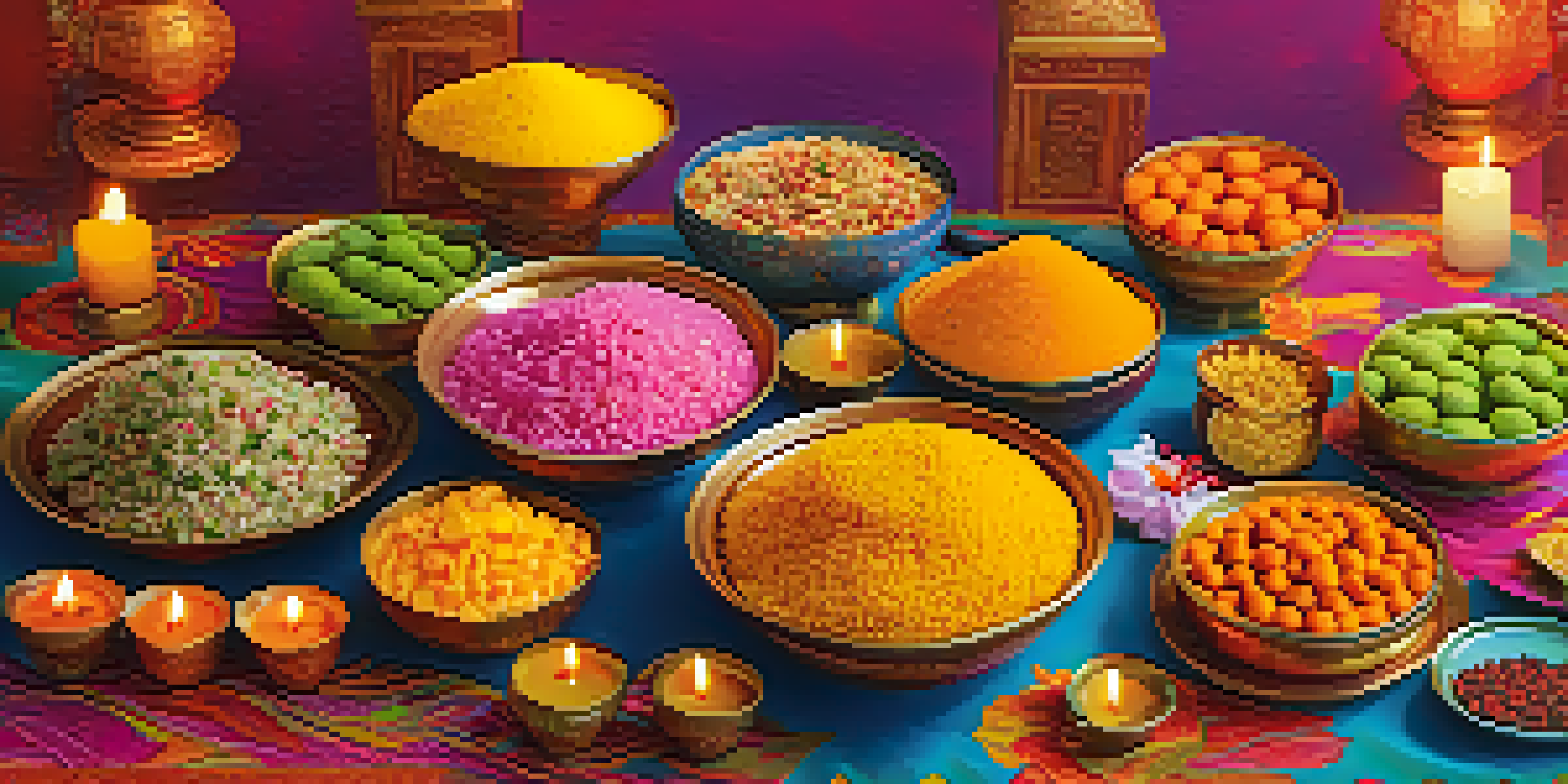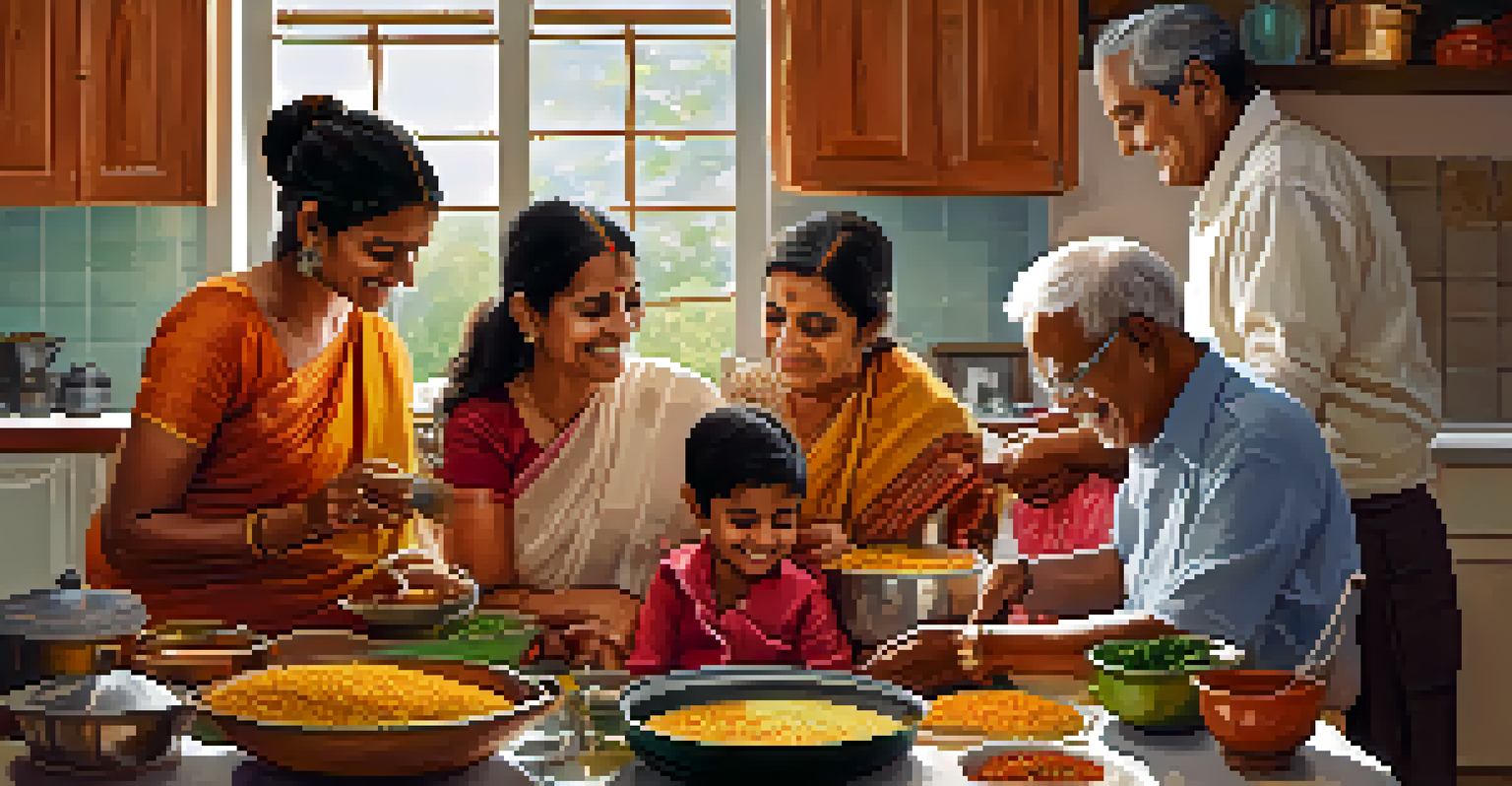The Role of Food in Hindu Spiritual Practices and Festivals

Food as Offerings in Hindu Rituals and Worship
In Hinduism, food plays a pivotal role in rituals and worship, often offered to deities as a gesture of devotion. This practice, known as 'prasad,' transforms the food into a sacred blessing, which devotees then consume. The act of offering food symbolizes gratitude and connection to the divine, creating a spiritual bond between the worshipper and the gods.
Food is symbolic of love when words are inadequate.
During various pujas (prayer rituals), specific dishes are prepared to honor the deities, reflecting their preferences and the season. For example, sweets are often made for Ganesh Chaturthi to celebrate Lord Ganesha, while other festivals may feature different regional specialties. This not only showcases culinary diversity but also reinforces the idea that food is a language of love and respect.
Moreover, the preparation and offering of food during rituals encourage mindfulness and community involvement. Families gather to cook together, fostering unity and sharing both the labor and joy of creating something sacred. This collective experience enhances the spiritual significance of food, making it a cornerstone of Hindu worship.
Festivals: Culinary Highlights in Hindu Celebrations
Hindu festivals are synonymous with vibrant celebrations, and food plays a central role in these joyous occasions. Each festival brings its own unique dishes, reflecting regional customs and seasonal ingredients. For instance, during Diwali, the festival of lights, families prepare an array of sweets and snacks, symbolizing prosperity and joy.

Similarly, during Pongal, a harvest festival celebrated in South India, rice cooked with jaggery, milk, and spices is offered to the sun god. This dish not only conveys gratitude for the harvest but also represents the abundance of nature. The food prepared during festivals serves as both nourishment and a medium to express cultural identity.
Food as a Spiritual Offering
In Hinduism, food is offered to deities as 'prasad,' symbolizing devotion and creating a spiritual bond between worshippers and the divine.
Sharing these festive foods with family and friends strengthens social bonds and fosters a sense of community. Meals become an avenue for storytelling, laughter, and connection, reinforcing the idea that food is not just sustenance but a way to celebrate life together. Thus, festivals become a delightful tapestry woven with flavors and shared experiences.
The Meaning Behind Specific Foods in Hinduism
In Hinduism, specific foods carry deep symbolic meanings that enhance spiritual practices. For example, milk and its derivatives, like ghee (clarified butter), are considered pure and are often used in rituals. These ingredients are believed to promote purity of mind and body, making them essential in offerings and religious ceremonies.
The act of eating together is a ritual that brings people closer, fostering community and shared experience.
Similarly, certain fruits, such as bananas and coconuts, are regarded as auspicious and are frequently offered to deities. The coconut, in particular, symbolizes the breaking of the ego, allowing devotees to connect with divine consciousness. This emphasis on symbolism highlights how food choices are intricately linked to spiritual beliefs.
Moreover, the concept of 'sattvic' food—pure, wholesome, and nourishing—plays a significant role in Hindu dietary practices. Sattvic foods, such as fresh fruits, vegetables, and whole grains, are believed to promote clarity and spiritual growth, contrasting with 'rajasic' and 'tamasic' foods that may lead to agitation or lethargy. Thus, the philosophy behind food choices reflects a broader understanding of spirituality in Hinduism.
Ayurveda and the Spiritual Significance of Food Choices
Ayurveda, the ancient Indian system of medicine, deeply influences dietary practices in Hinduism. It emphasizes the connection between food, health, and spirituality, advocating for a balanced diet that aligns with individual constitution and lifestyle. This holistic approach to food not only nurtures the body but also supports spiritual well-being.
According to Ayurveda, each food has a unique energy that affects the mind and spirit. For instance, spicy foods may stimulate the senses but could also lead to restlessness, while calming herbs promote tranquility and focus. By being mindful of these effects, practitioners can make conscious food choices that enhance their spiritual practices.
Festivals Celebrate Culinary Diversity
Hindu festivals showcase unique dishes that reflect regional customs and foster community connections through shared meals.
Integrating Ayurvedic principles into daily life encourages a deeper appreciation for the food consumed. It fosters awareness of how food impacts not just physical health but also mental clarity and emotional stability. In this way, food becomes a vital tool for spiritual growth, helping individuals cultivate a harmonious existence.
Prasad: The Sacred Food of Hindu Devotion
Prasad holds a special place in Hindu spirituality, representing the divine grace bestowed upon devotees. After offerings are made to the deities, the blessed food is shared among worshippers, reinforcing the idea of communal sharing and gratitude. Consuming prasad is believed to purify the mind and body, creating a sacred bond between the divine and the devotee.
The significance of prasad transcends mere nourishment; it embodies the essence of spiritual devotion. Different temples may have their unique prasad offerings, such as the famous 'laddu' from the Siddhivinayak Temple in Mumbai. This creates a sense of belonging and continuity within the community, as devotees eagerly await their share of the divine blessing.
Moreover, the act of receiving and consuming prasad fosters humility and appreciation. It serves as a reminder of the interconnectedness of all beings and the importance of sharing blessings with others. Through prasad, food becomes a medium for spiritual connection, reinforcing the values of love and generosity essential in Hinduism.
Food as a Means of Spiritual Discipline
In Hindu spiritual practices, food is not only a source of sustenance but also a method of discipline. Many devotees practice fasting during specific festivals or religious observances, which helps to purify the body and mind. This act of restraint is believed to elevate spiritual awareness and deepen the connection with the divine.
Fasting can take various forms, from complete abstinence to consuming specific foods, depending on personal beliefs and traditions. For instance, during Navratri, many Hindus refrain from consuming grains and opt for fruits and vegetables instead. This temporary shift encourages mindfulness and self-control, vital aspects of spiritual growth.
Ayurveda's Influence on Food Choices
Ayurveda emphasizes the spiritual significance of food, promoting a balanced diet that nurtures both physical health and spiritual well-being.
Additionally, food habits can reflect one's spiritual journey. Adopting a vegetarian or sattvic diet aligns with the principle of 'ahimsa' (non-violence), promoting compassion towards all living beings. By consciously choosing what to eat, individuals can enhance their spiritual practices and foster a deeper sense of purpose in their daily lives.
Culinary Traditions: Connecting Generations through Food
Culinary traditions in Hinduism serve as a bridge connecting generations and preserving cultural heritage. Family recipes passed down through the years not only nourish but also tell stories of ancestors and their practices. Cooking and sharing these traditional dishes reinforce family bonds and create a sense of identity rooted in spirituality.
During festivals, the preparation of specific dishes often involves the participation of all family members, from grandparents to children. This collective effort fosters a sense of belonging and teaches younger generations about their cultural and spiritual heritage. The kitchen becomes a sacred space where rituals, stories, and flavors intertwine.

Furthermore, these culinary traditions often reflect the regional diversity within Hinduism. Each community adds its unique twist to traditional recipes, celebrating local ingredients and customs. This variation enriches the overall experience, allowing families to embrace both their roots and their evolving identities within the broader tapestry of Hindu spirituality.